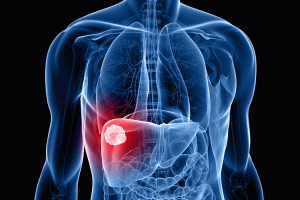
The Food and Drug Administration (FDA) approved atezolizumab in combination with bevacizumab for patients with unresectable or metastatic hepatocellular carcinoma who have not received prior systemic therapy.
Efficacy was investigated in IMbrave150 (NCT03434379), a multi-centre, international, open-label, randomised trial in patients with locally advanced unresectable or metastatic hepatocellular carcinoma who had not received prior systemic therapy.
A total of 501 patients were randomised (2:1) to receive either atezolizumab 1200 mg as an intravenous infusion (IV) followed by bevacizumab 15 mg/kg IV on the same day, every 3 weeks, or sorafenib orally twice daily.
The main efficacy outcome measures were overall survival (OS) and independent review facility (IRF)-assessed progression-free survival (PFS) per RECIST 1.1.
Additional efficacy outcome measures were IRF-assessed overall response rate (ORR) per RECIST 1.1 and mRECIST.
Median OS was not reached in the patients who received atezolizumab plus bevacizumab and was 13.2 months (95% CI: 10.4, NE) in the patients who received sorafenib (HR 0.58; 95% CI: 0.42, 0.79; p=0.0006).
Estimated median PFS was 6.8 months (95% CI: 5.8, 8.3) vs. 4.3 months (95% CI: 4.0, 5.6), respectively (HR 0.59; 95% CI: 0.47, 0.76; p<0.0001).
The ORR per RECIST 1.1 was 28% (95% CI: 23, 33) in the atezolizumab plus bevacizumab group compared with 12% (95% CI: 7,17) in the sorafenib group (p<0.0001). The ORR per mRECIST was 33% (95% CI: 28, 39) vs. 13% (95% CI: 8, 19), respectively (p<0.0001).
The most common adverse reactions (reported in ≥20% of patients) with atezolizumab plus bevacizumab in patients with HCC were hypertension, fatigue and proteinuria.
The recommended atezolizumab dose is 1,200 mg, followed by 15 mg/kg bevacizumab on the same day every 3 weeks.
If bevacizumab is discontinued, atezolizumab should be given either as 840 mg every 2 weeks, 1,200 mg every 3 weeks, or 1,680 mg every 4 weeks.
Source: The Food and Drug Administration
We are an independent charity and are not backed by a large company or society. We raise every penny ourselves to improve the standards of cancer care through education. You can help us continue our work to address inequalities in cancer care by making a donation.
Any donation, however small, contributes directly towards the costs of creating and sharing free oncology education.
Together we can get better outcomes for patients by tackling global inequalities in access to the results of cancer research.
Thank you for your support.